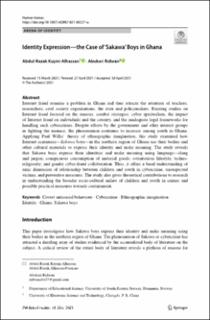Identity Expression—the Case of ‘Sakawa’ Boys in Ghana
Peer reviewed, Journal article
Published version
Permanent lenke
https://hdl.handle.net/11250/2985807Utgivelsesdato
2021Metadata
Vis full innførselSamlinger
- Institutt for pedagogikk [269]
- Publikasjoner fra CRIStin [3401]
Originalversjon
Alhassan, A.-R. K. & Ridwan, A. (2021). Identity Expression—the Case of ‘Sakawa’ Boys in Ghana. Human Arenas. https://doi.org/10.1007/s42087-021-00227-wSammendrag
Internet fraud remains a problem in Ghana and thus attracts the attention of teachers, researchers, civil society organisations, the state and policymakers. Existing studies on Internet fraud focused on the reasons, combat strategies, cyber spiritualism, the impact of Internet fraud on individuals and the country, and the inadequate legal frameworks for handling such cybercrimes. Despite efforts by the government and other interest groups in fighting the menace, the phenomenon continues to increase among youth in Ghana. Applying Paul Willis’ theory of ethnographic imagination, this study examined how Internet scammers—Sakawa boys—in the northern region of Ghana use their bodies and other cultural materials to express their identity and make meaning. The study reveals that Sakawa boys express their identities and make meaning using language—slang and jargon; conspicuous consumption of material goods; ostentatious lifestyle; techno-religiosity; and gender cyber-fraud collaboration. Thus, it offers a basal understanding of emic dimension of relationship between children and youth in cybercrime, unsuspected victims, and preventive measures. The study also gives theoretical contributions to research in understanding the broader socio-cultural milieu of children and youth in crimes and possible practical measures towards containment.

